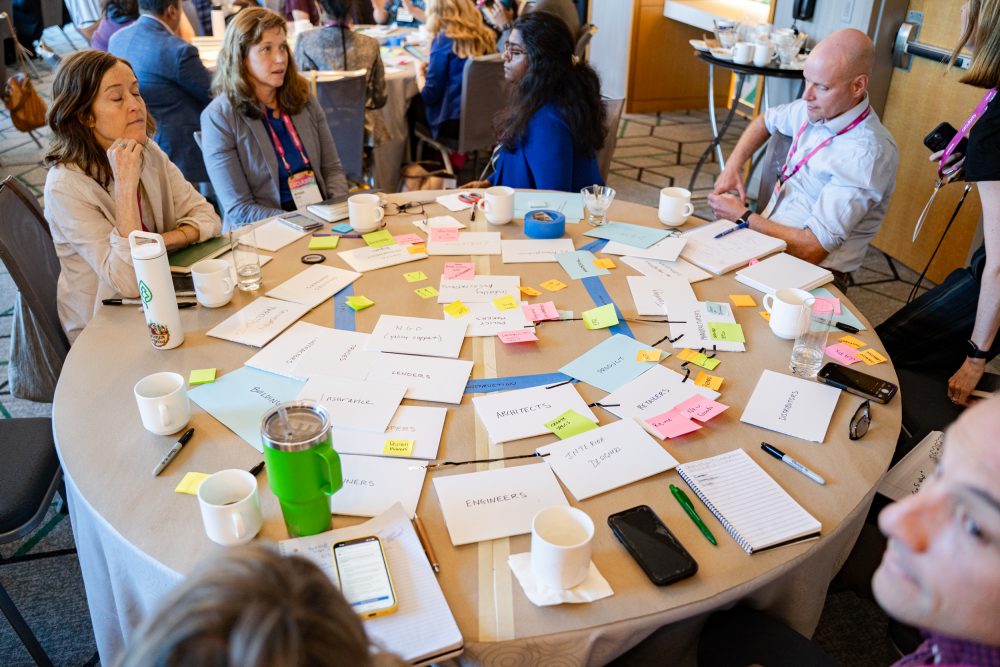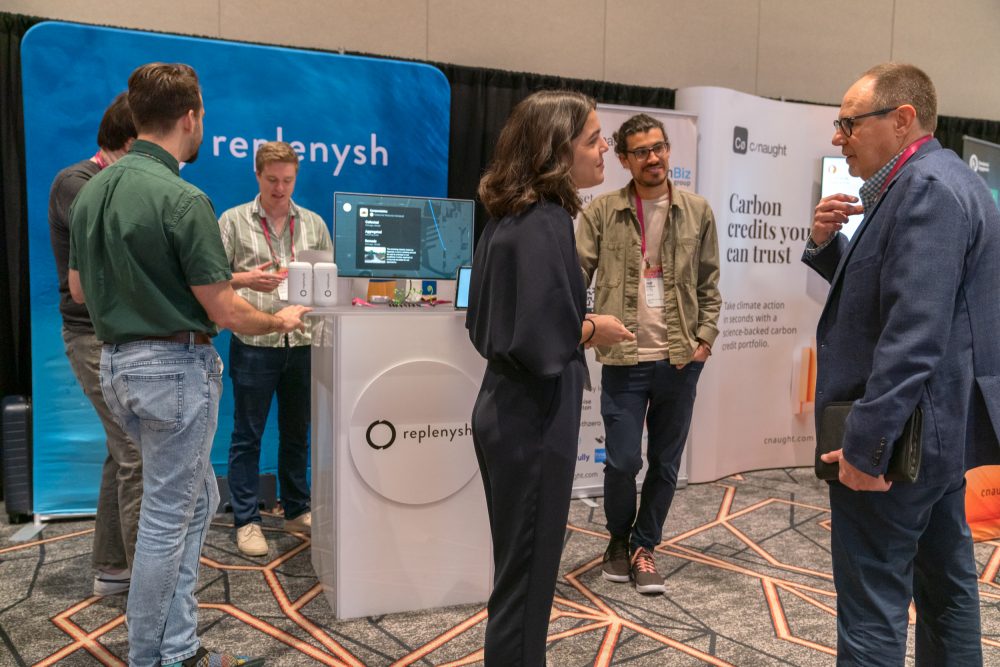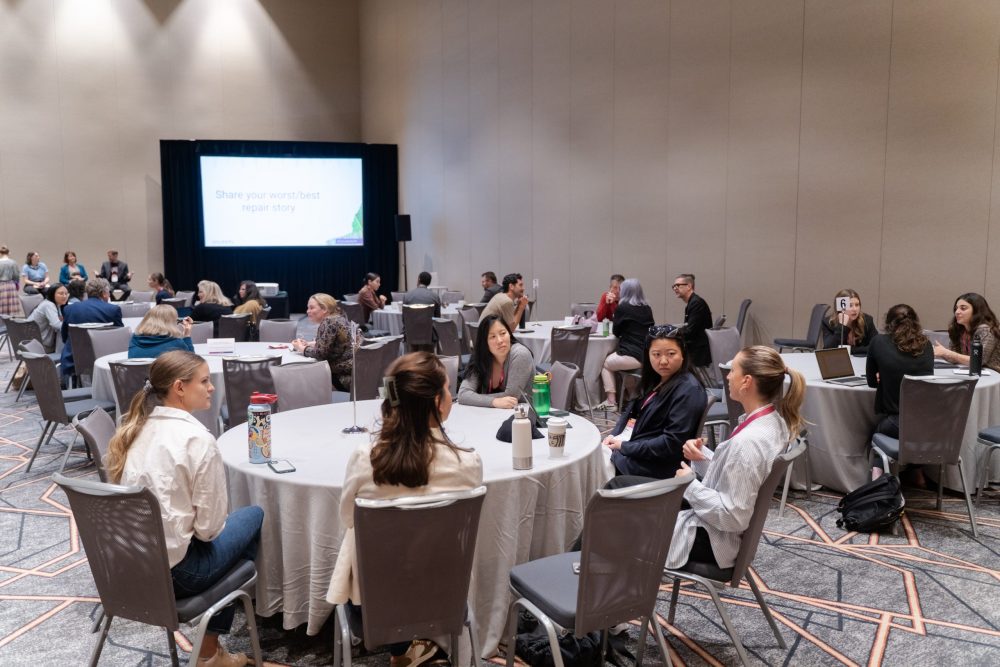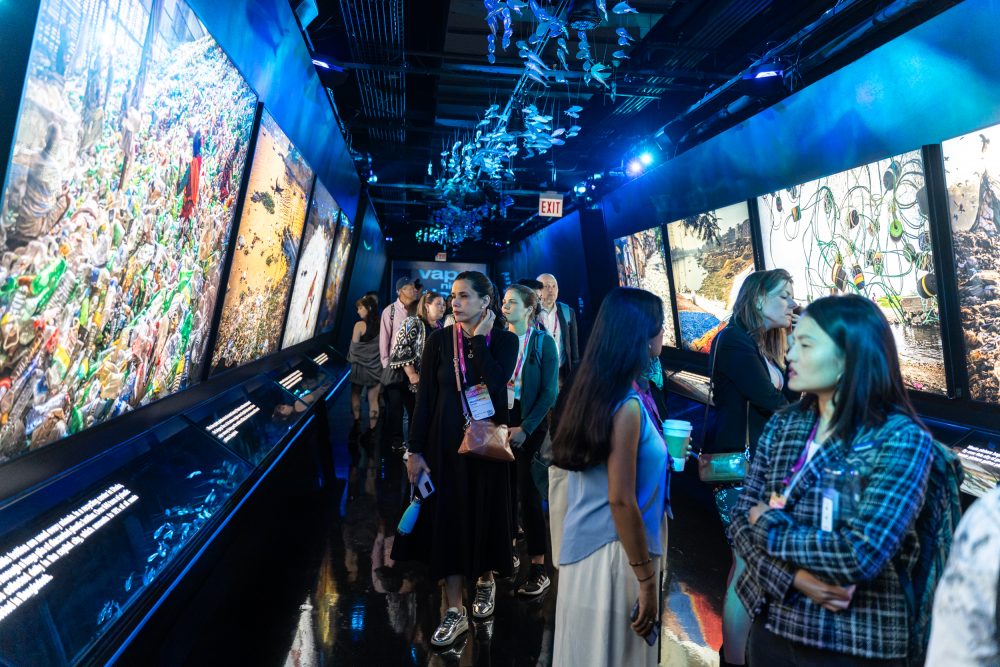WDM’s Cynthia Milota shares key learnings, insights and new resources from the recent Circularity 24 Conference.
Begun in 2019, the Circularity conferences are produced by GreenBiz Group, a media and event company dedicated to a just transition to a clean economy. This year attracted almost 1300 attendees, offered 104 sessions and drew more than 300 speakers. Convened in Chicago, attendees represented corporations as well as entrepreneurs, nonprofits, trade associations, investors, public agencies and policy experts. Sponsors included Deloitte, Dow, L’Oreal, Coca-Cola, SAP and the Recycling Partnership and a host of others.
At its core, this conference was transparent & traceable.

The conference organizers supercharged their commitment to eliminating waste by partnering with innovative organizations who share sustainable conference planning goals.
-
- The GreenBiz Food Policy offers plant-rich meals, creating low-carbon, waste-free menus that respect diverse dietary preferences. Greener by Default consulted for the event, encouraging sustainable plant-based options. Preventing problematic event waste by working with the venue’s capabilities, balanced the sustainability goals of the event and the community.
- Copia managed the food donations by redistributed 448 surplus meals from the 3-day conference (which translates into 537 pounds of food) to nonprofits in Chicagoland. “In America today, 40% of the food we produce goes wasted, while 1 in 6 people are food insecure. What this means: hunger in our country is not a scarcity problem, it’s a logistics problem,” (1).
- r. World reduced single use waste by providing reusable r.Cups at all the conference venue’s water dispensers. r.World handles the logistics, the sanitizing, the deliveries, and the quality control. The result: dumpster after dumpster of single use plastic is diverted from landfills.
- Replenysh managed the material recovery and waste donations by collecting and source separating materials and compostables. Replenysh’s technology tracked each material to end-markets with transparency.

Recycling is not Reuse
Keeping the built environment out of the landfill was a reoccurring conference theme. Specific definitions brought clarity to terms often incorrectly used interchangeably.
“Recycling is the process of collecting and processing materials that would otherwise be thrown away as trash and turning them into new products,” (2). Built environment recycling examples include steel studs and carpet tile.
Reuse is to use a material again, sometimes in a different way or after reclaiming or reprocessing, (3). Built environment reuse examples include reusing ceiling tile, furniture, doors, lighting.
Eliminating end-of-life solutions for existing buildings to protect the embodied carbon, include a combination of software marketplaces, brick and mortar reuse centers and government programs. (4)
Rheaply is a “B2B SaaS resource management technology to scale reuse and the circular economy within organizations, helping lower procurement and storage costs,” (5). Rush Medical Center was presented by Rheaply as a case study exemplified material reuse across their Chicago campuses.
The ReBuilding Exchange is often cited for their two retail stores in Chicago and Evanston (a near north suburb). They are a repository of building materials, appliances, lighting fixtures, reclaimed and historic wood. Working to keep usable materials out of landfills, their inventory comes from individual donations, their team’s deconstruction projects and partners in the building industry. The deconstruction of an old barn in Evanston, IL’s 5th ward by the ReBuilding Exchange team serves as an example of workforce training, landfill diversion and historic preservation in one project. Some of the salvaged wood was incorporated into a new school built in the district.
Trash is only trash if you name it.
–Aina Gutierrez, Exec Director of the ReBuilding Exchange
 Chicago’s Cook County has made addressing the landfill crisis a priority. There are no open landfills in the county and all the state’s available landfills will be at capacity in 40 years, (6). The county’s commercial Demolition Debris Diversion Ordinance requires all demolition permits to divert 70% of their debris from landfills. On the residential side, all demolition projects must show that 5% of their debris is diverted for reuse, (7). The county is “actively expanding recycling and non-traditional infrastructure related projects and programs around the County,” (8), such as repair cafes, tool libraries, material exchanges and reuse centers.
Chicago’s Cook County has made addressing the landfill crisis a priority. There are no open landfills in the county and all the state’s available landfills will be at capacity in 40 years, (6). The county’s commercial Demolition Debris Diversion Ordinance requires all demolition permits to divert 70% of their debris from landfills. On the residential side, all demolition projects must show that 5% of their debris is diverted for reuse, (7). The county is “actively expanding recycling and non-traditional infrastructure related projects and programs around the County,” (8), such as repair cafes, tool libraries, material exchanges and reuse centers.
While there is tremendous potential, nascent appetite and interest for reused building materials, logistics and scheduling often complicate their incorporation into projects. Scale is also an issue. The FF&E (furniture, fixtures and equipment) market is more developed in terms of reuse and repair. Without governmental mandates, incorporating reclaimed building materials will currently not be the lowest bid, despite being the most circular option.
Partnerships: Tried & New
To date, ten US states have adopted Bottle Bills which is a “type of legislation that requires a small deposit to be paid on certain types of beverage containers, with the deposit refunded to the consumer upon returning the container to a designated location,” (10). Oregon was the first in 1971, with 9 other states following in the next 25 years: California, Connecticut, Hawaii, Iowa, Maine, Massachusetts, Michigan, New York and Vermont. These laws have documented increased recycling (Oregon has a 90.5% redemption rate) and reduced total litter in the environment between 34-64% compared to states without Bottle Bill laws, (11).
The Bottle Bills are also good economics, saving businesses an estimated $9 Billion annually in litter cleanup (12). And if similar container deposit return systems were adopted nationwide, the National Container Recycling Institute projects 100,000 new jobs could be sustained to support the process.
New ideas in built environment circularity partnerships notably include Mycocycle. Reframing how we think about waste, Mycocycle uses fungi micro mediation to break down discarded construction debris. Mycelium is taught to eat trash. They neutralize toxic constituents in materials such as drywall, concrete and carpet. The byproduct material is used to replace petrochemicals in the manufacturing of flooring, concrete and insulation.
(Let’s have) radical collaboration over competition
– Mark Armen, Founder of Replenysh
Mycocycle has partnered with Lendlease Communities in Operation Re-shingle/Recycle, using fungi to decarbonize construction waste, specifically roofing shingles. Mycocycle is also partnering with Tarkett to test the effects of mycelium on all types of flooring collected through their ReStart Program. The resulting byproduct would be a central ingredient in new flooring products.
Scaling: Planet Positive
The sustainability executives from IKEA/US and Lululemon discussed corporate strategies to achieve their Circularity goals by 2030. Both pledges, at their core, move toward the use of only renewable or recycled material content for their products.
Central to their plans are buyback programs where consumers return products for resale. IKEA’s Buy Back & Resell program, has been in place in the US since 2022. Customers fill out an online form, are sent a quote with the value of their product, offered compensation via store credit and then the item is resold in the “AS IS” section of the store. Not all products are available for this service. Lululemon’s Like New program accepts gently used items for resale online. Customers receive an eGift card credit based on the value of the garment or item returned.

Both retailers also have significant commitments to the renewable and/or recycled content of their material stock. At IKEA over 97% of the wood used is Forest Stewardship Council (FSC) sourced and 17% of the total wood used is recycled, (13). Lululemon is partnering with Samsara Eco on the first enzymatically based process to recycle the complex Nylon 6.6 for re-use.
(Circularity) is who you are, not what you do.
–Javier Quinones, CEO & Chief Sustainability officer, IKEA US
Land Mines & Lifelines
When sustainability was discussed in organizations 20 years ago, “all was great, vegetarian every Tuesday…gold star. Walmart said sustainability is efficiency and keeps operations tight. And corporate America saved money for shareholders,” (14). Now that all the easy wins and low hanging fruit have been taken, being circular is hard and costs money that doesn’t show up in the P&L. Organizations end up in the Triangle of Stagnation: 1) multi-stakeholder dialogues (aka, too many cooks in the kitchen); 2) future commitments (that are just long enough out, that there will be new leadership team by then); 3) small pilots (that drain resources but go nowhere.)
It’s like the Bermuda Triangle—sustainability initiatives disappear under mysterious circumstances, never to be seen again.
–Tom Szaky, Founder Terra Cycle
Exiting the triangle of stagnation means having common industry metrics to start. Product Digital Passports (DPP) are analogous to food nutritional labels. “DPPs are a tool for collecting and sharing product data throughout its entire lifecycle used to illustrate a product’s sustainability, environmental and recyclability attributes,” (15). They include the following data (16):
- Raw Material composition
- Sourcing & sustainability data
- Information relating to manufacture
- Supply Chain journey
- Carbon Footprint
- Recyclability
- Product Lifecycle Data

In the US, there is no current trustworthy infrastructure to share data at scale, however DPPs will be required in the EU starting in 2026. Circularity fact labels will change decision making for consumers and built environment professionals.
Actionable change requires a truthful assessment of a problem, established goals, agency & willpower to act and a strategic pathway to get there.
– Molly Kawahata, Systemic Impact Strategies
The transformative power of hope-based leadership frames environmental issues through the lens of public health in communities and families, (17). Hope as a mindset, can be learned and deployed. Hope is an effective narrative of inevitability, if you do X, then we can do Y together. The science of hope impels people to act, as it cuts down fear and guilt. Give stakeholders, employees, agencies, organizations and people a hopeful bandwagon to jump on. There will be transformative benefits.
Circularity 24 offered real examples of recycling and reuse in action, explored established and new partnerships, discussed how to scale corporate circular initiatives and offered hopeful next steps toward a more circular build environment.
With over 1,000 attendees at Circularity 24, the 2025 event, now named Circularity, is looking forward to its seventh year of learning and innovation. Registration opens in September. Use this link to be notified when registration for the Colorado conference opens, and SAVE THIS IN YOUR CALENDAR because WDM readers get 10% off when they register with this code: C25WDM10. See you in Colorado!
All photos courtesy of Burgundy Visuals.
References
- Sustainability at Circularity 24. Retrieved from: https://www.greenbiz.com/events/circularity/2024/sustainability-programs
- US Environmental Protection Agency, Recycling Basics & Benefits. Retrieved from: https://www.epa.gov/recycle/recycling-basics-and-benefits
- Merriam-Webster Dictionary. Retrieved from: https://www.merriam-webster.com/dictionary/reuse#:~:text=%3A%20to%20use%20again%20especially%20in,need%20to%20reuse%20scarce%20resources
- Circularity 24 Session: Keeping the Built Environment out of the Landfill. Retrieved from: https://www.greenbiz.com/events/circularity/sessions/keeping-built-environment-out-landfill
- Rheaply LinkedIn. Retrieved from: https://www.linkedin.com/company/rheaply/
- IL Environmental Protection Agency. IL Landfill Disposal Capacity Report. Retrieved from: https://epa.illinois.gov/content/dam/soi/en/web/epa/topics/waste-management/landfills/landfill-capacity/documents/landfill-capacity-report-2023.pdf
- Cook County Government. Demolition Permitting. Retrieved from: https://www.cookcountyil.gov/service/demolition-permitting#:~:text=Why%20do%20I%20need%20a,is%20being%20diverted%20for%20reuse.
- Circularity 24 Session: Keeping the Built Environment out of the Landfill. Slides from: Anthony Tindall, Cook County Solid Waste Coordinator.
- Cook County IL Government. Solid Waste. How Much Waste is Generated? Retrieved from: https://maps.cookcountyil.gov/solidwaste/
- Revino. A Brief Bottle Bill History in Oregon. Retrieved from: https://www.revinobottles.com/a-brief-bottle-bill-history-in-oregon/#:~:text=In%20addition%20to%20the%20environmental,for%20state%20and%20local%20governments.
- Container Recycling Institute. Bottle Bill Resource Guide. Retrieved from: https://www.bottlebill.org/index.php/benefits-of-bottle-bills/litter-studies-in-bottle-bill-states#:~:text=The%20effects%20of%20deposit%20systems,by%20only%2015%20percentage%20points.
- Circularity 24 Keynote. Jeff Merkley, Senator/Oregon. Retrieved from: https://www.youtube.com/watch?v=MUkR0HXzz8o&list=PLyVZcHL_zmn6Z315XkjRy5KlZIUl0UvX-&index=10
- IKEA. The Wood We Use. Retrieved from: https://www.ikea.com/global/en/our-business/people-planet/wood-we-use/
- Circularity 24 Session. Ask an Expert: Tom Szaky and the Triangle of Stagnation. Tom Szaky, Terra Cycle Founder.
- Protocol. Digital Product Passports (DPP): The Complete Guide. Retrieved from: https://www.protokol.com/insights/digital-product-passport-complete-guide/
- Protocol. Using Digital Product Passports to Build a Sustainable Circular Economy. Retrieved from https://www.protokol.com/insights/using-digital-product-passports-to-build-a-sustainable-circular-economy/
- Circularity 24 Session. The Transformative Power of Hope-Based Leadership. Molly Kawahata, Principal Systemic Impact Strategies.


